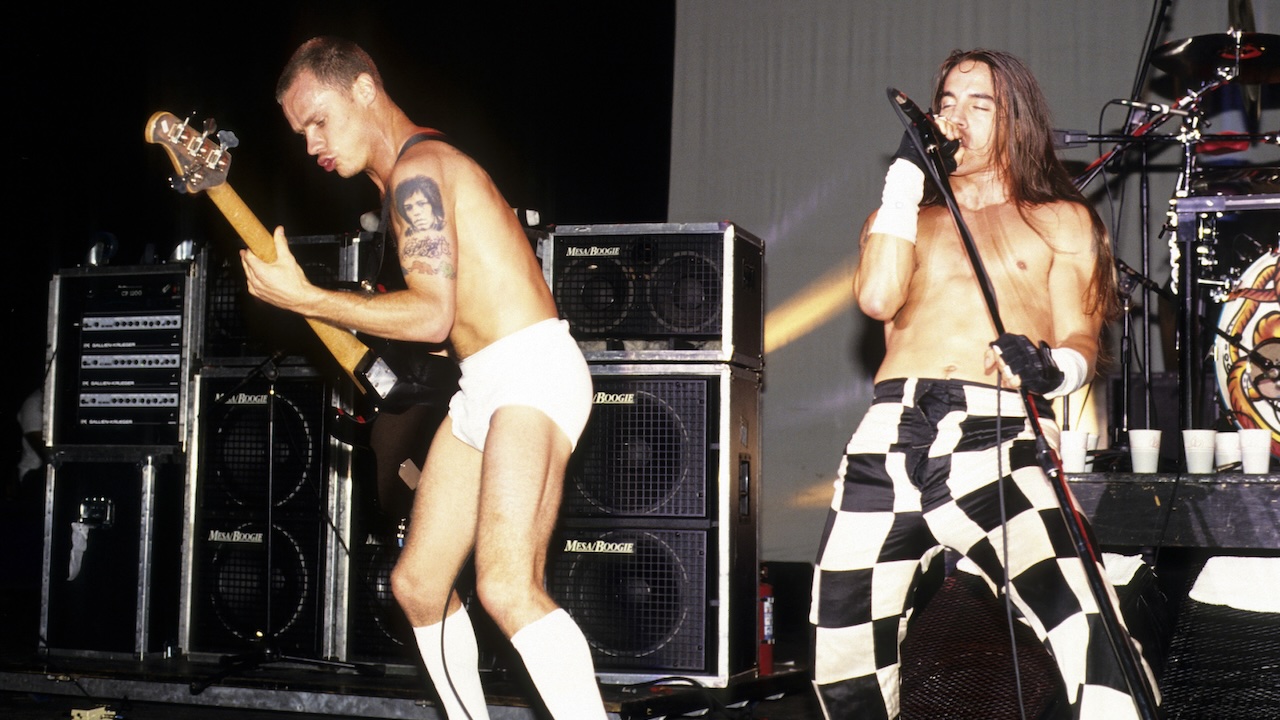“John Lydon once made a stab at poaching Flea for Public Image. At which point Flea keeled over and passed out”: Anthony Kiedis takes a nostalgic look back at Flea’s finest hour from Blood Sugar Sex Magik
Flea’s reputation as a killer bass player almost saw him lured away from the Red Hot Chili Peppers

"We work hard," wrote Red Hot Chili Peppers bassist Michael ‘Flea’ Balzary in the liner notes of 2004's Greatest Hits album – a world away from the club-level act that his band had been two decades before. That hard work has led him to the position of Best Bassist in multiple Bass Player polls even though, as he tells us, he's nowhere near being the bassist that he really wants to be.
An Australian who moved to California as a kid and endured a tough childhood which you can read all about in his 2019 autobiography Acid For The Children, Flea – so nicknamed for his habit of leaping about on stage, like you didn't know that already – is probably his demographic's most visible bass player. He won his category in Bass Player's 100 greatest bassists poll by a significant margin, indicating that many of you reading this would agree with that assessment.
A founding member of the Red Hot Chili Peppers, Flea's reputation as a killer bass player had almost seen him lured away at one point. “John Lydon once made a great stab at poaching Flea for Public Image,” Anthony Kiedis reported in Bass Player. “And Malcolm McLaren tried to poach the whole band.”

“He sat down with us, watched us rehearse, and then he said, ‘Okay, here's the plan, guys. We're going to simplify the music completely, so it's just basic, old- school, simple three-chord rock ’n’ roll, and we'll have Anthony be the focus of attention, and you guys will be the back-up band doing this surf-punk thing.’ At which point Flea keeled over and passed out.
“It could have been what we had smoked – we were very dysfunctional at that point – but I think it was more what McLaren said.”
A jazz and punk-rock obsessive since his early days, Flea's bass parts are deft without being over-polished, fast without lacking heart, and infused with a hippie sensibility that is equal parts Larry Graham and Peter Hook. Nowhere is this more evident than on the Chili Peppers' 1991 album, Blood Sugar Sex Magik.
One of the high points of the album is the most obviously Chili Pepper-sounding song on it, the relentless Give It Away.
All the latest guitar news, interviews, lessons, reviews, deals and more, direct to your inbox!
Nowadays the long-time RHCP fan will not be able to hear its opening salvo – a ringing, string-bent chord from John Frusciante plus Chad Smith's staccato snare – without punching the air. Like its big-rock-single contemporaries of the time – Nirvana's Smells Like Teen Spirit and Metallica's Enter Sandman – Give It Away has been a club staple for so long that it inevitably evokes early-'90s emotions.
But there's a reason why Give It Away has become such a benchmark: it is, without a doubt, one of the catchiest singles to be released in the last few decades. Once heard, it sticks deep in the listener's ear and will not be removed.
The core of this catchiness is twofold. Firstly, Flea's simple, elegant bassline – a simple upper-register slide with a three-note tail – is among his most effective work to date, taking the less-is-more philosophy which he had often spoken of on the BSSM album to an elevated level. Only on two or three occasions does he drop in one of the deft fills for which he had become famous, making the whole effort a masterclass in economy.
Secondly, Kiedis' vocal – the closest to a rap, rather than singing, that he comes on this record – hangs on a repeated boast of, “Give it away, give it away, give it away now,” all of which he enunciates perfectly in couple of seconds at most. It's a fantastic piece of vocal acrobatics and is all the more remarkable since Kiedis is not known for the speed or dexterity of his vocals, before or since.

The song made a profound impact. Kiedis later explained: “I was toy shopping in New York right before Christmas, and this little girl was tugging on her mom's coat, pointing at me and going, ‘That's him, that's him.’ And her mom came over and said, ‘Oh, I've just got to thank you, you've made my life so much easier.’
“She said the only way she could get her little girl dressed in the morning was to play our record and sing to her. And to me, the appreciation of a child is the ultimate compliment.”
Joel McIver was the Editor of Bass Player magazine from 2018 to 2022, having spent six years before that editing Bass Guitar magazine. A journalist with 25 years' experience in the music field, he's also the author of 35 books, a couple of bestsellers among them. He regularly appears on podcasts, radio and TV.

